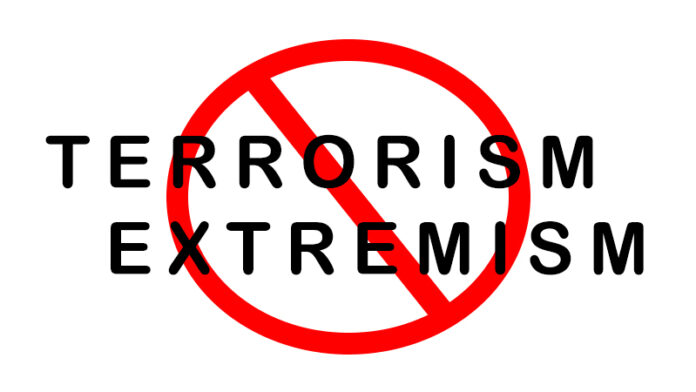वेदाविनाशिनं नित्यं य एनमजमव्ययम् ।
कथं स पुरुषः पार्थ कं घातयति हन्ति कम् ॥
[Translation: “O Partha, how can a person who knows that the soul is indestructible, unborn, eternal and immutable kill anyone or cause anyone to kill?”] – Shrimad Bhagavad Gita (Shlok 2.21, Chapter 2, Verse 21)
By Anurag Sharma
The birth of Pakistan out of Bharat as a separate nation in 1947 was mainly based on religious identity. The partition sowed the seeds of hatred, followed by massive human migration on both sides, but the killing of people in Pakistan based on religious identity. For more than 30 years, Pakistan has been sponsoring terrorism in Bharat with intentions to destabilise the law-and-order situation, mainly in the Union Territory (UT) of Jammu and Kashmir (J&K) [hereafter J&K]. Bharat did not witness a major terrorist attack in any of its theatres in last year; however, terrorism-related incidents, such as attacks on security forces in Kashmir, arrests, surrenders, and gunfights between security forces and terrorists, shape trends and provide projections for the current.
The paper aims to highlight the trends of extremism and terrorism in 2023 and their implications in the near future. This article focuses on developments that have been documented in five major theatres: i) the Union Territory of Jammu and Kashmir, ii) Left-Wing Extremism (LWE)/Naxalism, iii) Insurgency in North-East States, iv) Islamic Extremism, and v) Radical Sikh Elements, followed by a forecast for the current year.
The Union Territory of Jammu and Kashmir
The cooperation of security forces in the Valley has improved significantly since August 2019, when the Government of Bharat nullified Articles 370 and 35A, and the State was recreated as a Union Territory on 31 October 2019. After the nullification of Article 370, the safety of the people of the UT became an utmost priority of the Central Government. The J&K region did not witness any significant terrorist attack like Pulwama style; however, few such conspiracies were foiled by security forces. Due to Bharat’s ‘zero-tolerance policy’ toward terrorism and effective strategies in place, the number of terrorism-related incidents is significantly less as compared to the previous year.
The decline in the number of incidents reflects the optimum synchronisation between security forces, the intelligence fraternity, government administration, and the local population in the UT. The terrorism-related incidents also include other activities carried out by terrorists, including arms snatching, kidnapping, and others. From a counter-terrorism perspective, apart from a couple of unfortunate incidents at the end of the year, 2023 can be considered one of the most successful years. According to the numbers shared by the J&K Director-General of Police (DGP) — RR Swain, “in 2023, in total 113 terrorists were neutralised. There has been a decline in local recruitment, while foreign terrorists are taking the lead.” Over the period, local key commanders of Jaish-e-Mohammad (JeM), Hizb ul-Mujahideen (HM), and Lashkar-e-Taiba (LeT) were eliminated, which gave a setback to the recruitment for ranks within the Valley.
There was a false sense of uncertainty regarding the law-and-order situation post-abrogation of Article 370 and the recent verdict of the Supreme Court declaring the decision to abrogate the Article as entirely constitutional. However, with the government’s strategic planning and efforts towards peace, no adverse situation occurred in the Valley. The overall law and order situation in the UT has significantly improved, and instances of stone-pelting have become history. According to the Ministry of Home Affairs data, the number of organised stone pelting incidents has reduced to Zero in 2023, compared to 1,221 incidents recorded in 2018.
The longevity or survival rate of newly recruited terrorists has decreased due to utmost strategic planning and good coordination among security forces. In 2023, terror recruitment in the Valley witnessed an 80 per cent decline. In his ‘New Year 2024’ address to the police personnel, J&K DGP Swain mentioned that in various CT operations, J&K Police eliminated 21 local terrorists. In contrast, the count of foreign terrorists was over 50, including key commanders of different terrorist groups. “In various operations, 89 terror networks and 18 hideouts were busted,” added DGP Swain.
In its fight against Organised Crime, including terrorism, human trafficking, and narcotics smuggling, the National Investigation Agency (NIA) arrested 625 accused and attached criminal assets worth ₹56 Crores in 2023, with a conviction rate of 94.70 per cent.
In 2023, NIA registered 68 cases, including 18 Jihadi-related, 12 cases related to Left-Wing Extremism (LWE), 07 cases against Terror-Organised Crime Syndicates in Punjab, 05 cases in relation to insurgency in the North-East Bharat, and 02 cases of Fake Indian Currency Notes (FICNs).
Chart 5 highlights a nearly 28 per cent increase in the arrests made by the NIA in 2023 compared to the previous year. In various anti-national activities, the NIA arrested 625 operatives in 2023. Out of 625 arrests, 65 arrests were in Islamic State (IS)/ISIS cases, 114 arrests were in Islamic Extremism/Jihadi cases, 45 arrests in cases related to human trafficking, 76 arrests in cases of Left-Wing Extremism (LWE)/Naxalism, and 28 arrests were in terror-organised crime nexus related cases; remaining 297 arrests were made in other anti-national activities.
Over the past four years, the NIA has expanded its nationwide branch offices, added new offences related to Non-Traditional Security (NTS) threats like drug trafficking, human trafficking, the production or sale of illicit weapons, and incidents involving Fake Indian Currency Notes (FICN), all of which have enhanced the agency’s investigative capacity and efficiency.
Left-Wing Extremism
Left-Wing Extremism (LWE)/Naxalism has carried out attacks against security personnel and civilians in 2023. The organisation— Communist Party of India (Maoist)/CPI (Maoist) and all of its manifestations are designated as ‘terrorist organisations’ under Section 35 of Bharat’s UA(P) Act, 1967 and listed in the first schedule of the same Act. The degree of LWE exposure varies by state and has improved generally in Maoist-affected States, including Kerala, Maharashtra, Andhra Pradesh, Chhattisgarh, Jharkhand, Odisha, Telangana, and West Bengal. The “National Policy and Action Plan to Handle LWE,” approved by the Bharatiya government in 2015, contemplates a multifaceted approach that includes security measures, development projects, and safeguarding local people’s rights.
The slight increase in the number of incidents reflects that despite an effective anti-Naxal ecosystem in place, Maoists continue to strike against security forces and civilians to maintain their presence. However, in the last three years, there has been improvement in the situation due to security forces’ essential presence, improved operations tactics, and continuity in the implementation of various welfare programmes launched by the Central and State governments for those residing in LWE-affected areas.
With the cooperation of the Central government, the State governments in LWE-affected regions have been working tirelessly to implement several social packages, which have helped to alleviate the LWE issue. Three primary strategies have been put into place by the Ministry of Home Affairs (MHA) to address the issue of LWE: i) improved coordination between the federal government and state governments, ii) a relentless approach to countering extremist violence, and iii) public engagement in development initiatives aimed at ending the support for LWE ideology. In addition to numerous ministries’ flagship initiatives, there are programmes for LWE-affected communities that emphasise enhancing telecommunications, increasing the road network, and empowering education.
Insurgency in North-Eastern States
The Central government supports the state government’s attempts to combat the illegal operations of rebel organisations active in North-Eastern states through various means. Following insurgent groups are proscribed as Unlawful Associations under Section 3 and designated as terrorist organisations under Section 35 of the UA(P) Act:
- United Liberation Front of Asom (ULFA),
- National Democratic Front of Bodoland (NDFB) in Assam,
- Meitei Extremist Organisations of Manipur:
- People’s Liberation Army (PLA) and its political wing— Revolutionary People’s Front (RPF),
- United National Liberation Front (UNLF) and its armed wing, Manipur People’s Army (MPA),
- The People’s Revolutionary Party of Kangleipak (PREPAK) and its armed wing— Red Army,
- Kangleipak Communist Party (KCP),
- Kanglei Yaol Kanba Lup (KYKL),
- Coordination Committee (CorCom),
- Alliance for Socialist Unity Kangleipak (ASUK)
- All Tripura Tiger Force (ATTF),
- Hyruiiewtrep National Liberation Council,
- National Liberation Front of Tripura (NLFT), and
- National Socialist Council of Nagaland (Khaplang).
In comparison to 331 incidents recorded in 2022, around 534 incidents were recorded in 2023. In May 2023, ethnic violence erupted between the Meitei people (a majority) in Imphal Valley and the Kuki-Zo tribal community from the surrounding hills. On 15 May, the Union Home Minister attended a series of meetings with Manipur’s Chief Minister, leaders from the Meitei and Kuki communities, and other stakeholders to discuss the steps taken to restore peace in the State. According to an official figure, as of 15 September 2023, around 175 people were killed and over 70,000 people displaced from their homes during the violence.
The Union Ministry of Home Affairs (MHA) has been putting into practice a welfare programme that offers financial assistance and training in vocational skills, among other perks, in exchange for the surrender and rehabilitation of insurgents. Due to the programme, many insurgents from different factions have given up and joined the mainstream.
On 29 November 2023, the Central and Manipur governments signed a peace agreement with the United National Liberation Front (UNLF) that established ground rules. The peace agreement was a historical development in the region, as it was the first time that an armed group from the Valley in Manipur consented to come over to the mainstream by shunning violence and upholding the Bharatiya Constitution. A month later, on 29 December 2023, the oldest and key insurgent faction in Assam— the United Liberation Front of Asom (ULFA), signed an accord with the Central government and the Assam government to shun the violence and join the political process. Both agreements, signed by UNLF and ULFA, will end violence and usher in a new era of welfare and prosperity for the youth of the North-East region.
Islamic Extremism (Excluding Terrorism in UT of J&K)
The presence of Islamic extremism in Bharat is a complex and multifaceted challenge which requires a comprehensive response. It is primarily sponsored by radicals based in Pakistan; however, it also has an ideology of transnational terror organisations, including al-Qa’ida and Islamic State (IS). For radicalising Muslim youth in Bharat, Islamic extremist groups have made efforts using misinterpretations of religious texts and disseminating deeds of jihad via social media.
Despite repeatedly threatening Bharat and the presence of radical ideology among a small segment of Muslims, al-Qa’ida and IS have failed to leave a significant mark in Bharat. Post-2017, the IS has been attempting to expand its operations via like groups in Africa, West Asia, and Afghanistan, following its so-called fictional vision of establishing a ‘global caliphate’. The IS published an inaugural issue of Serat ul-Haq in January 2023, targeting Bharatiya Muslim politicians and raising concerns on the issue of ‘love jihad’. In its six-page debut issue— “The Plight of Muslims in India”, the magazine disseminated anti-Bharat propaganda. The magazine’s second edition, which came out in March 2023, called on Muslims to wage jihad against Bharat and criticised Bharatiya Islamic scholar Maulana Mahmood Madani for encouraging interfaith harmony.
Earlier in April 2022, the Islamic State Hind Province (ISHP) integrated all its anti-Bharat forums into a single group— Nashir al-Hind, which translates the content of IS central command into the Hindi language. Serat ul-Haq aims to gain more traction among Muslims in Bharat.
In September 2022, the Government of Bharat, in a well-planned effort to combat Islamist extremism, proscribed the Popular Front of India (PFI) and its affiliated groups for five years under the strict UA(P) Act. Following the ban, several arrests were made related to PFI, and the NIA foiled extremist conspiracies. On 08 April 2023, the Assam Police arrested three PFI and Campus Front of India (CFI) leaders in Barpeta, Assam. Following the PFI ban, its operatives joined the Social Democratic Party of India (SDPI), an active political party in Karnataka. According to the data from the NIA 2023, the agency carried out 1040 search operations/raids compared to 957 in 2022.
Radical Sikh Elements
Well-organised criminal groups that carry out a range of illegal operations, such as targeted assassinations, extortion, drug misuse, and other anti-national acts, are still becoming more prevalent in Punjab. The infamous episode of Ajnala Police Station in Amritsar gave an impression of a revival of extremism in Punjab. On 23 February 2023, followers of radical Sikh preacher Amritpal Singh (Sandhu) attacked the Ajnala police station and violently demanded the release of one of his close-aids. Following an intense operation launched in March, on 23 April 2023, Amritpal Singh surrendered and was arrested under various Acts, including National Security Act (NSA) 1980, from Moga, Punjab.
In recent years, Pakistan’s Inter-Service Intelligence (ISI) Directorate has provided support to the banned outfit Sikh For Justice (SFJ), which has been taking advantage of the vulnerable situation of law and order under the Aam Aadmi Party (AAP)-led administration and the frustration of the people due to misgovernance. A handful of Sikh radical elements living in the West are propagating anti-Bharat and anti-Hindu narratives and causing harm to Hindu-Sikh harmony. In 2023, the NIA’s activities against radical Sikh groups located overseas continued to focus on the activities, including vandalisation of Hindu temples in Canada, attacks on India’s High Commissions in Canada and the United Kingdom (UK), as well as the Consulate General of Bharat/India in San Francisco, the United States (US). As part of its efforts to uncover the conspiracy behind the assaults on Bharatiya Missions overseas, the federal agency conducted over 50 raids/searches and identified 43 extremists. In recent months, the NIA has intensified its probe into these cases, questioning more than 80 people in Bharat accused of being involved in the conspiracy.
Pakistan’s ISI Directorate relentlessly pursues its ‘K2— Kashmir and Khalistan’ agenda against Bharat, directing organised crime syndicates (OCS) or drug traffickers to smuggle narcotic substances in Punjab. As a mode of operation, drug traffickers acting under the umbrella of ISI toss packages carrying narcotic drugs over the border barrier in places where infiltration is not expected, and their counterparts on this side of the border retrieve the consignment later. According to the figures from Punjab Police, in 2023, police seized 1,161 kg of heroin, 795 kg of opium, around 40,000 (400 quintals) of Poppy Husk, and 83.17 lakh tablets/injections/vials of pharma opioid in various anti-drugs operations across the State. Around ₹ 13.67 Crore was also recovered from 14,951 drug smugglers.
In addition to the issue of drug trafficking in Punjab, there is a grave concern associated with the growing number of drone sightings in Punjab along the international border. The emergence of the Organised Crime Syndicate (OCS) also poses a challenge to police authorities in Punjab. Carrying out anti-OCS/gangster operations, “Punjab Police’s Anti-Gangster Task Force (AGTF) cracked 188 modules and arrested 482 gangsters/criminals,” said Inspector-General of Police (IGP), Headquarters, Dr Sukhchain Singh Gill.
The available data on drone infiltration at the International Border (IB) between Bharat and Pakistan reveals that in 2023, Border Security Force (BSF) shot 107 drones and seized 442 kg of heroin. Drones have dropped packs of heroin originating in Afghanistan on several occasions, facilitating the illegal trade and funding terrorist activities in Punjab and J&K.
Forecast for the Current Year
The Union Territory of Jammu and Kashmir
The significant cooperation between security forces and intelligence has been brought to light by the comparative success of counter-terrorism (CT) operations in 2022 and 2023 (J&K). Major terrorist organisations LeT, JeM, and HM have had their “spine” shattered by the Valley’s effective CT operations, which has also curbed their terrorist activity; however, their affiliated factions/off-shoot terror groups—The Resistance Force (TRF), Kashmir Tigers (KT), and People’s Anti-Fascist Front (PAFF) carried out small-scale activities. They would continue to pose security challenges in 2024, mainly in the first half of the year as General Elections 2024 approaches. Pakistan set up these shadow organisations as distractions to reduce pressure from other countries and international bodies such as the United Nations and the Financial Action Task Force (FATF). After getting delisted from the FATF’s ‘Grey List’, Pakistan may opt to increase cross-border terror activities and activate the sleeper cells.
Left-Wing Extremism
The year 2023 witnessed mixed but optimistic results in LWE-affected areas. The Maoists would continue to rebuild their operational capabilities in their spheres of influence even though the majority of Maoists who turned themselves in or were arrested had given a jolt to the cadre. However, in 2024, we may see a slowdown in the Maoist activities. The continuance of welfare programmes in Maoist-affected areas will encourage the locals to assist security forces in anti-Naxal operations if needed. The overall trend in Maoist violence and activity across the country must be contained through additional security interventions and a sense of urgency, as the Maoists have demonstrated significant capacities for resurrection in the past and maintain an essential operational capability in key areas of their dominance. The security forces must overcome operational and capacity deficits to prevent further Naxal resurgence.
North-East Insurgency
As the situation is complex and dynamic, the forecast for 2024 is challenging. However, the peace agreements between Central and State governments and the oldest insurgent groups from Assam and Manipur underline the possibility of arrangements that will open the way for welfare and ending violence. The rise in incidents and killings was significant in 2023, and the aftermath of the Manipur incident is likely in the first half of 2024 until both stakeholders, Meitei and Kuki, accept a political solution with a re-establishment of trust in the Centre and State government.
Conversely, the NSCN-IM group will continue its six-decade-long struggle and the Naga flag in search for solutions to build a political identity. The Indo-Naga official meeting conducted in Delhi on 14 November 2023 was inconclusive; nonetheless, there is no standstill on looking forward to further solutions/talks. In 2024, the NSCN-IM is anticipated to continue with its political agenda while posing a security threat. The central government must balance the interests and aspirations of different stakeholders involved in peacebuilding in the region and ensure that the welfare and security arrangements are inclusive and sustainable.
Islamic Extremism
Since the inception of Wilayah al-Hind, a branch for South Asia, in 2019, the Islamic State (IS) has attempted to create a false image of presence in the Valley; however, the arrest of IS operatives/sympathisers points toward a percentage of Muslim youth getting lured to the propaganda. The arrested IS terrorists admitted that online content or propaganda on various social media platforms plays a significant role in radicalisation. The PFI and its affiliated organisations’ five-year ban will severely hinder their attempts to engage in anti-Bharat activities. However, as the past has shown, the threat might take numerous forms. For example, the Indian Mujahideen (IM) was declared a terrorist group, and the Students’ Islamic Movement of India (SIMI) gave rise to PFI and other similar groups.
The lawful solution on unlawfully claimed/occupied Hindu establishments will be a triggering point to be used by Islamic extremist organisations for radicalisation and recruitment into the groups. Bharat’s strategic partnership/relationship with Saudi Arabia, Qatar, the United Arab Emirates (UAE), and other West Asian countries will play a significant role in countering Islamic extremism and contain the operational capacity of such groups. Bharat’s expertise in counter-terrorism may play an essential role in the UN Security Council’s measures against terrorism and money laundering; in particular, an international agreement on the proposed Comprehensive Convention on International Terrorism (CCIT) is highly expected.
Radical Sikh Elements
The episode of baseless allegations against Bharat for the killing of terrorist Hardeep Singh Nijjar in June 2023 in Canada had created a disturbance in Bharat-Canada relations. Pro-Khalistan actions outside Bharat, particularly in the United States (US), Canada, and the United Kingdom (UK), may pose difficulties for law enforcement authorities and the Bharatiya diaspora and thus bilateral relations. The 2024 General Elections are anticipated to be targeted by anti-Bharat and anti-Modi groups who may collude to undermine the law-and-order situation in various parts of the nation. Despite the ban on the Sikh for Justice (SFJ) and its other manifestations, pro-Khalistan content on different social media platforms, including X/Twitter, Meta/Facebook-owned Instagram, and Facebook, will be a concern. The SFJ’s so-called ‘Khalistan Referendum’, which involves voting for a separate State, is also a security matter that must be discussed with respective countries. In 2024, despite its internal political and economic turmoil, Pakistan’s ISI Directorate will continue to fuel and support anti-Bharat Sikh radical groups with a conspiracy to carry out low-level terror attacks in Punjab.
This article first appeared in www.vifindia.org and it belongs to them.








